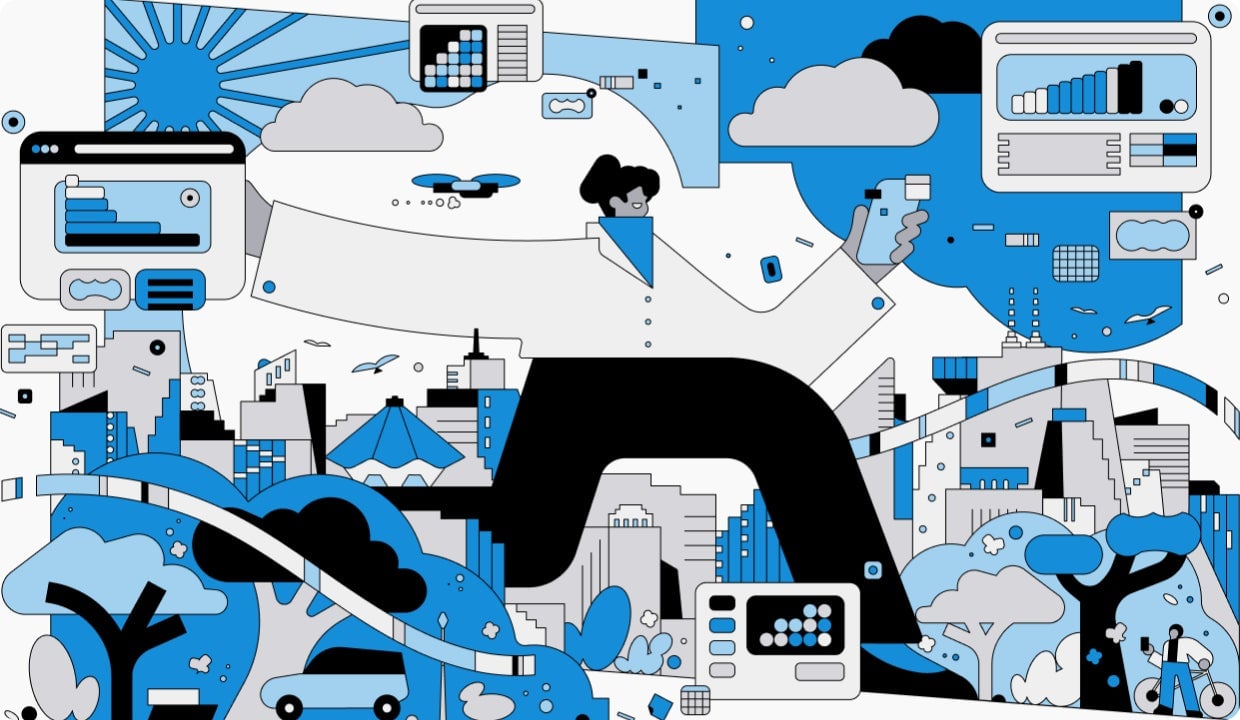✦ Fixing Africa’s fertilizer problem
Startups are tackling agricultural value chain issues

Hi Quartz Africa members,
Apologies for the delay in sending this newsletter. Let’s get to it!
One of the biggest factors holding back African agriculture is the cost of inputs. Expensive fertilizer and seeds are out of reach for many smallholder farmers, yet they’re necessary to improve crop yields and boost the continent’s food security.
Pandemic disruptions and Russia’s invasion of Ukraine sent economic shockwaves across Africa, including in agriculture, where around 80% of all the fertilizer used across the continent—which is but a small part of the total that would be needed for Africa to realize its immense agricultural potential—is imported.
In Ghana, which imported 52% of all of its fertilizer from Russia, Ukraine, and Belarus as of May, the war’s disruption drove a deficit of 350,000 metric tonnes of fertilizer, leading to a spike in price, reduced availability, and, consequently, lower crop yields.
The crisis has spurred the country, as well as several other African nations to initiate plans to produce more fertilizer of their own, to avert similar scenarios in the future. West Africa alone accounts for around 40% of all fertilizer consumed in sub-Saharan Africa. East and southern Africa account for the remaining 60%.
Besides inputs, investment worth billions of dollars is required in storage, technology adoption, irrigation, infrastructure, and market access. A lack of proper storage, for example, is one of the leading causes of post-harvest losses, which cost the continent around $4 billion of its total food production every year.
Startups in Africa are plugging some of these gaps in agricultural value chains by offering innovative solutions for farmers, agro-processors, and food manufacturers. As a result, venture funding for African agritech startups has been rising steadily, from just around $1 million in 2019 to $10 million in 2020 and $75 million in 2021.
Cheat Sheet
💡 The opportunity: Improving access to inputs, markets, and education about best practices will help African farms realize their immense agricultural potential.
🤔 The challenge: Africa remains overly reliant on imported inputs, including fertilizer, and infrastructure in many areas can be poor, driving up costs for farmers.
🗺️ The roadmap: Startups need innovative models to enable affordable access to inputs and markets, and must work with other stakeholders to plug gaps in agricultural value chains.
💰 The stakeholders: Startups, governments, policy makers, investors and financiers.
52%: The share of Ghana’s fertilizer imported from Russia, Ukraine and Belarus
350,000 tons: Ghana’s fertilizer shortage as a result of the Ukraine war
$4 billion: The value of African food production lost post-harvest every year
$75 million: Total venture funding for agritech startups in Africa in 2021, up from $1 million in 2019 and $10 million in 2020
1%: The share of global venture funding received by African agritech startups in 2021
Case study
Established in 2013 by Alloysius Attah and Emmanuel Owusu Addai, Farmerline is an agritech startup supporting farmers, agro-dealers, and food manufacturers with tailored solutions. It was founded in Ghana, where around 70% of the five million-strong farming population consists of smallholder farmers. Farmerline is planning to expand into Francophone Africa, starting with Côte d’Ivoire, and across west Africa.
Farmerline gives farmers access to quality inputs including fertilizers and seeds through a large network of local agro-dealers. The startup offers financing for agro-dealers to stock up on inputs, as well as credit for farmer groups to buy equipment such as tractors and combine harvesters. The dealers effectively serve as a distribution network. Farmerline guarantees delivery of inputs in 24 to 72 hours, and operates a fleet of trucks and bikes.
Farmerline opted to work with dealers—as opposed to reaching farmers directly—after realizing that these stores were already the first port of call for most smallholder farmers. The company says it has financed over $18 million worth of inputs and crops over the past few years. Farmerline also offers post-harvest facilities for farmers, including cleaning, sorting, lab-testing, and bagging.
“The demand for input credit is high from farmers, but there are few service providers for them because the cost of monitoring and recovering loans is expensive: traveling to visit individual, rural farmers for example,” Attah said. “This is another area where digital tools can help to reduce costs.”
Food manufacturers use Farmerline’s platform to order commodities such as rice, maize, soy beans, cowpeas, groundnuts, sorghum, cashews, and yams. Supporting all this is Mergdata, Farmline’s intelligence platform, which was named among TIME’s 100 best inventions of 2019. Attah told Quartz that Mergdata has thus far helped connect farmers to over $40 million worth of potential purchase orders.
Mergdata integrates tools for GPS farm mapping, farm management, food supply chain management, traceability, and farm identification. Data and insights from Mergdata guide Farmerline’s assessments of productivity, risk profiles, and supply chain gaps, helping to ensure that food processors have a constant, traceable supply of quality commodities. While Farmerline operates in west Africa, the company says Mergdata has been licensed in 35 countries and serves 1.5 million farmers.
Traceability, in particular, is a key selling point for food manufacturers operating in Africa, as it is an especially important requirement for processors keen on meeting international standards. A good example is the KFC debacle earlier this year, when the fast-food chain faced boycotts in Kenya after a fries shortage revealed that it imports frozen potato from Egypt and South Africa, to the dismay of many Kenyans. KFC cited traceability issues as one of the reasons for importing fries to maintain standards across outlets, as opposed to buying potatoes from Kenyan farmers.
Farmerline also offers farmers access to education through alerts and a free automated call service, reaching them in their native languages with information on weather patterns and best practices such as climate-smart farming.
In September, Farmerline secured $1.5 million in equity funding from the Dutch impact investor Oikocredit in the second close of its pre-Series A round, bringing the total amount raised in the round to $14.4 million, including $6.4 million in debt funding. The round closed just as fertilizer prices in Ghana and across Africa doubled as a result of the Ukraine war, allowing Farmerline to position itself as a long-term solution to farmers’ input problems.
In Conversation with Alloysius Attah

💸 On what makes fertilizer expensive in Africa
“One of the main components in fertilizer is natural gas, so as the price of nitrogen goes up, the cost of inputs also goes up drastically…Freight charges had increased during covid-19, so the cost of fertilizer went up around that time. There are also local transportation costs to consider. Last year we spent 10ghs ($0.86) moving one bag of fertilizer from Tema Port to the northern part of Ghana. This year, it’s costing us twice the price. This increase was caused by currency depreciation and a rise in fuel prices.”
🏭 Why Africa must produce its own fertilizer:
“We need to produce more fertilizers on the continent to avoid exposure to forex, as well as reduce transportation costs. However, this is all a long-term play. In the short term, the private sector can work closely with governments to provide holistic and affordable finance to local fertilizer distributors. And perhaps incorporate insurance, which will make financial institutions more comfortable to give out loans and take more risks. Discount programmes and rewarding loyalty can also help.”
🤝 On why collaboration is necessary to fix African agriculture:
“Beyond fertilizer, underlying challenges with irrigation, climate change, and crop insurance threaten food security in Africa. The transportation of commodities is also very expensive and one of the biggest challenges for rural farmers, because it excludes them from getting access to quality services on their farms. Crops go bad because they don’t have access to markets and there are no warehouses for storage.”
More Agritech deals to 👀
The Dutch startup Almacena, a B2B marketplace for African agricultural products, raised a $3.4 million seed round in October. Almacena provides industrial coffee buyers with a sourcing hub, and promises traceability and transparency.
iProcure, a Kenyan agritech startup, announced a $10.2 million Series B round in Augustas it looks to roll out a credit offering for agro-dealers. The startup provides agricultural inputs such as fertilizers and seeds at discounted prices compared to prevailing market prices.
Nile, a South African agritech startup, raised $5.1 million in May, in an equity funding round led by Naspers Foundry. It connects farmers to commercial retailers of fresh produce in South Africa and across the continent.
This member brief was prepared while listening to McMca by Wakadinali 🇰🇪. Have a fun, productive week!
—Martin Siele, Nairobi-based contributor
One 🤑 thing
In 2020, African countries imported agricultural products worth $4 billion and $2.9 billion from Russia and Ukraine respectively.